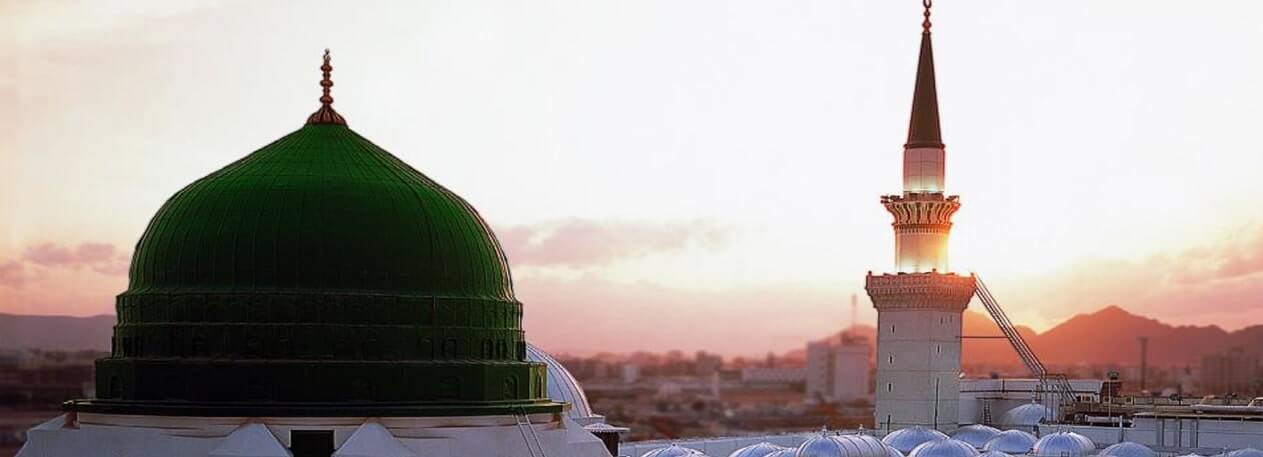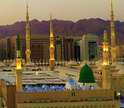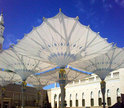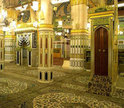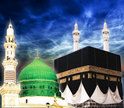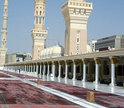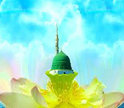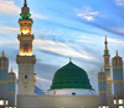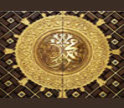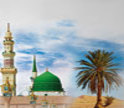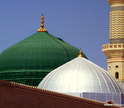Suckling period
In babyhood, the Beloved and Blessed Rasool صَلَّی اللّٰہُ تَعَالٰی عَلَیْہِ وَاٰلِہٖ وَسَلَّم first drank the milk of Suwaybah the slave-girl of Abu Lahab. He صَلَّی اللّٰہُ تَعَالٰی عَلَیْہِ وَاٰلِہٖ وَسَلَّم then drank the milk of his mother Sayyidatuna Aaminah رَضِیَ اللهُ تَعَالٰی عَنْهَا. Then Haleemah Sa’diyyah رَضِیَ اللهُ تَعَالٰی عَنْهَا took him to her tribe where she suckled him. He صَلَّی اللّٰہُ تَعَالٰی عَلَیْہِ وَاٰلِہٖ وَسَلَّم spent his suckling period with her.1
(Madarij-un-Nubuwwah, vol. 2, pp. 18)
Respected Arabs used to send their children for suckling to the villages in the outskirts where children would grow healthy in clean and healthy environment and would also learn original and excellent Arabic language. The language of cities had mingled with foreigners and was no longer original and excellent.
Sayyidatuna Haleemah رَضِیَ اللهُ تَعَالٰی عَنْهَا stated: Along with the women of the tribe ‘Bani Sa’d’, I went to Makkah hoping to find any child for suckling him. Arabia was affected by severe drought that year. I had a baby but I did not have enough milk to suckle him due to destitution and starvation. The baby would continue to cry the whole night with hunger and we would spend the whole night sitting and comforting him. We also had a she-camel but it did not also have milk. While travelling to Makkah, I was riding a mule that was too weak to keep pace with the caravan. My travelling companions were sick of it. At last, we finished the journey having faced a lot of hardships.
When women saw the Holy Nabi صَلَّی اللّٰہُ تَعَالٰی عَلَیْہِ وَاٰلِہٖ وَسَلَّم and heard that he was an orphan2 , they did not prefer to foster him because they expected no great reward in return, thinking that he was an orphan. On the other hand, fortune smiled on Haleemah Sa’diyyah رَضِیَ اللهُ تَعَالٰی عَنْهَا. Lack of milk in her proved to be great grace for her. No one was prepared to give their baby to her due to her lack of milk.
Haleemah Sa’diyyah رَضِیَ اللهُ تَعَالٰی عَنْهَا said to her husband ‘Haaris Bin ‘Abdul Uzza’, ‘Returning empty-handed is not good. We should at least take this orphan with us.’ Her husband agreed and Haleemah رَضِیَ اللهُ تَعَالٰی عَنْهَا took that orphan with her who was going to ‘brighten’ not only the homes of Sayyidatuna Haleemah رَضِیَ اللهُ تَعَالٰی عَنْهَا and Sayyidatuna Aaminah رَضِیَ اللهُ تَعَالٰی عَنْهَا but also the east and the west of the entire universe. It was only by the great grace of the Almighty that Sayyidatuna Haleemah رَضِیَ اللهُ تَعَالٰی عَنْهَا was blessed with the Holy Nabi صَلَّی اللّٰہُ تَعَالٰی عَلَیْہِ وَاٰلِہٖ وَسَلَّم . Bringing him into her tent, she sat down to suckle him. Blessings of Nubuwwah poured down like the rain of mercy. Glory be to Allah عَزَّوَجَلَّ in the highest! Sayyidatuna Haleemah رَضِیَ اللهُ تَعَالٰی عَنْهَا was blessed with so much milk that the Holy Nabi صَلَّی اللّٰہُ تَعَالٰی عَلَیْہِ وَاٰلِہٖ وَسَلَّم and his Rada`ee[رَضاعِی] brother drank it until they felt satiated [i.e. the stomach was full]. Both of them went to sleep peacefully. When Haleemah Sa’diyyah رَضِیَ اللهُ تَعَالٰی عَنْهَا and her husband saw the she-camel, her udders were also full of milk. Her husband then milked it and both of them drank it until they were full. They also slept well the whole night.
The husband of Haleemah Sa’diyyah was amazed to notice these blessings of the Holy Nabi صَلَّی اللّٰہُ تَعَالٰی عَلَیْہِ وَاٰلِہٖ وَسَلَّم . He said: ‘O Haleemah! You have brought a very blessed child!’ Sayyidatuna Haleemah رَضِیَ اللهُ تَعَالٰی عَنْهَا replied: ‘Indeed! I also expect that he is a very blessed child and has been bestowed upon us as Divine grace. I now hope that our home will be showered with blessings.’ 3
Sayyidatuna Haleemah رَضِیَ اللهُ تَعَالٰی عَنْهَا further stated: Afterwards, holding the Holy Nabi صَلَّی اللّٰہُ تَعَالٰی عَلَیْہِ وَاٰلِہٖ وَسَلَّم , I departed for our village from Makkah. The same mule of mine that used to walk very slowly was now walking so fast that no other animal could keep pace with it. Other women of the caravan asked me in surprise, ‘O Haleemah! Is it the same mule you rode while coming or you have bought another fast-running one?’ At last, we reached our home. There was severe drought in our village. The udders of all animals were dry, with no milk in them. But the udders of my goats were full of milk. Every day, as my goats returned from the pasture4, their udders were full of milk, whereas no one in the tribe could get even a single drop of milk. Seeing it, the people of my tribe asked their shepherds to graze their animals on the field where my animals grazed. Hence all began to graze their animals on the pasture where my goats grazed. But it was not a matter of pasture and jungle. It was actually the blessing of the Nubuwwah of the Beloved and Blessed Nabi صَلَّی اللّٰہُ تَعَالٰی عَلَیْہِ وَاٰلِہٖ وَسَلَّم . And no one other than me and my husband knew about it.5
In short, on every occasion, we continued to see the blessings of the Holy Nabi صَلَّی اللّٰہُ تَعَالٰی عَلَیْہِ وَاٰلِہٖ وَسَلَّم until the period of two years passed and I weaned6 him. The growth and health of the Holy Nabi صَلَّی اللّٰہُ تَعَالٰی عَلَیْہِ وَاٰلِہٖ وَسَلَّم were so good that he would look fairly big just at the age of two years. Following the custom, we then took him to his mother who bestowed upon us gifts and rewards as much as she could afford.7
(She further says) Although, according to the custom, we no longer had the right to take the Holy Nabi صَلَّی اللّٰہُ تَعَالٰی عَلَیْہِ وَاٰلِہٖ وَسَلَّم with us, we were not prepared to stay away from him even for a single moment because we had already witnessed his blessings. By chance, an epidemic disease broke out in Makkah that year. Giving the epidemic disease as a reason, we convinced Sayyidatuna Aaminah رَضِیَ اللهُ تَعَالٰی عَنْهَا to let us take him with us again. Hence we brought him with us to our home which once again became the source of blessings and mercy. He صَلَّی اللّٰہُ تَعَالٰی عَلَیْہِ وَاٰلِہٖ وَسَلَّم began to live among us happily. When his blessed age increased, he صَلَّی اللّٰہُ تَعَالٰی عَلَیْہِ وَاٰلِہٖ وَسَلَّم would go out of home and see other boys playing but he himself never played any type of game in childhood.8
One day, he صَلَّی اللّٰہُ تَعَالٰی عَلَیْہِ وَاٰلِہٖ وَسَلَّم said to me, ‘Dear mother! Where do my siblings [i.e. brothers and sisters] go every morning? I do not find them in home.’ I replied, ‘They go to graze goats.’ Listening to it, he said, ‘O kind mother! Allow me also to go with them.’ Hence, at his insistence, Sayyidatuna Haleemah رَضِیَ اللهُ تَعَالٰی عَنْهَا allowed him to go to the pasture along with children. Every day, he صَلَّی اللّٰہُ تَعَالٰی عَلَیْہِ وَاٰلِہٖ وَسَلَّم would go to the pasture where the goats of Sayyidatuna Haleemah رَضِیَ اللهُ تَعَالٰی عَنْهَا grazed. Taking goats to pastures and looking after them are Sunnahs of all Ambiya and Rusul. He صَلَّی اللّٰہُ تَعَالٰی عَلَیْہِ وَاٰلِہٖ وَسَلَّم showed a quality of Nubuwwah in childhood by doing that.9
1Madarij-un-Nubuwwah, chap. 1, vol. 2, pp. 18, 19; summarised
2Whom Allah عَزَّوَجَلَّ has taken special care of.
3Madarij-un-Nubuwwah, chap. 1, vol. 2, pp. 19, 20; summarised; Al-Mawahib-ul-Ladunniyyah ma’ Sharh-uz-Zurqaani, vol. 1, pp. 79
4 The field where animals feed
5Madarij-un-Nubuwwah, chap. 1, vol. 2, pp. 20
6To gradually stop feeding a baby with its mother’s milk.
7 Sharh-uz-Zurqaani ‘alal Mawahib, vol. 1, pp. 279; Al-Mawahib-ul-Ladunniyyah, vol. 1, pp. 82
8Sharh-uz-Zurqaani ‘alal Mawahib, vol. 1, pp. 278
9Madarij-un-Nubuwwah, chap. 1, vol. 2, pp. 21


